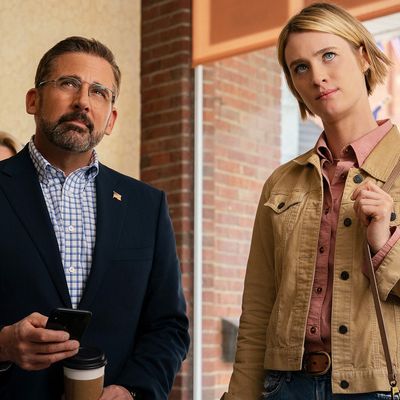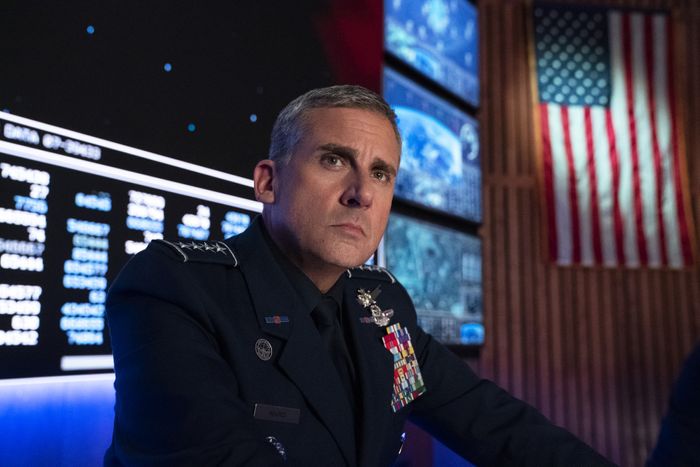
America’s adopted a lot of screen dads for itself over the years. Steve Carell has never really become one of them, despite being a celebrity with an endearingly dependable air, one who comes across as sturdy and as unassuming as, to cite a description attributed to Stephen Colbert in a New Yorker profile, “a manila envelope against a tan wall.” However menschy Carell might be as a person, as an actor, his strong suit has been playing absolute weirdos who just happen to look like the most dashing attendee of a harried PTA meeting. His finest creation, Brick Tamland in the Anchorman movies, takes this dissonance to such extremes that it’s almost avant-garde, his character essentially an extraterrestrial in the body of a television weatherman — not so much a walking dumb joke as an elaborate bit about what you can get away with in public when you have a veneer of blandly handsome presentability. Carell’s funniest roles (and his best dramatic one) tend to be paeans to the hollowness of a certain type of masculine authority. He is, in effect, an anti-dad.
In 2005, the most pivotal year in Carell’s career, he appeared in two of the defining comedic works of the young millennium, performing in both as men unsuccessfully playacting at their idea of normalcy. In March, The Office kicked off the wobbly first of what would go on to be nine seasons on NBC, with Carell in the role of nightmare regional manager Michael Scott. Ricky Gervais originated the U.K. version of the character as a smarmy narcissist, but Carell rooted his American equivalent in a desperation for approval, gradually turning Michael into someone you cringed on behalf of rather than at. In August, The 40-Year-Old Virgin, which Carell co-wrote with director Judd Apatow, premiered in theaters, with Carell playing Andy, a guy who’d made it to middle age as untouched as one of his mint-condition collectibles. Andy also managed to get to 40 untouched by the romantic posturing in which his co-workers ineptly attempt to instruct him — it’s ultimately his willingness to be vulnerable that gets him laid. Key to these roles was a measured sweetness guided by Carell, who gave Michael pathos and Andy charm without tamping down their respective strangeness. They were proof that Carell was capable of being not just a talented member of an ensemble but an actual star.
Looking back at those parts makes the last few months in Carell’s career all the more confounding. 2020 seemed like it was going to be another significant year for the 57-year-old, one in which he’d make a triumphant return to comedy after spending a not-quite-decade tilting toward the somewhat (The Big Short, Last Flag Flying, The Morning Show) and wildly (Foxcatcher) more dramatic. Carell’s far from the first comedic actor to take a turn toward the serious, though his yielded mixed results — he’s frequently a less dimensional presence in these roles, which tend to flatten out the subversive incongruities he’s worked out so well before. But this summer he once again had a new show and a new movie coming out, both comedies from trusted past collaborators. Space Force, from Office creator Greg Daniels, had a premise that sold itself — a Netflix series goofing on the sci-fi-sounding military branch that Donald Trump had signed into existence. Irresistible was Jon Stewart’s second go-round as a writer-director, as well as the former Daily Show host’s long-awaited return to political satire, a film about dueling political strategists who transform a Wisconsin mayoral election into a national battle. It was shaping up to be Carell’s year.
But, as it turned out, 2020 would be no one’s year, though the pandemic can’t entirely be blamed for why Space Force and Irresistible fell so remarkably flat. They are projects that would play as anodyne in regular times — the turbulence of the summer in which they premiered just making their relevance-adjacency more obvious. But both are also anchored by performances from Carell that feel lost, as though he weren’t confident in, or even aware of, the intended tone for either project. He comes across as curiously reluctant to be the punch line of the joke — as though somewhere along the way, he just lost his taste for playing the fool. And Mark R. Naird, the general Carell plays in Space Force, and Gary Zimmer, the Democratic strategist he plays in Irresistible, sure seem like they’re meant to be fools. Or at least, foolish, characters who’ve risen to the top of their respective military-political mechanisms by being devoted to their work and never picking up their heads long enough to consider what their work means to the country.
Gary is a jaded D.C. professional who, smarting from the 2016 presidential-election loss, heads to a struggling Wisconsin community hoping to rack up a much-needed triumph by persuading a former Marine to challenge the Republican mayoral incumbent. Once he’s there, he talks down to and over the locals while slavering over evidence of the salt-of-the-earth authenticity of his candidate, Jack Hastings (Chris Cooper), like Gollum with the ring. Gary is all Stewart’s ideas about soulless political machinery incarnate — and yet Carell imbues the character with a sitcom-lead haplessness. Moments that are meant to highlight Gary’s oblivious condescension instead play as failed jokes, like when he devours a gift of strudel in his car (he enjoys baked goods?) or orders a Bud and a burger at a bar that doesn’t serve either (why wouldn’t they tell him?). In a sequence in which Gary explains the superiority of haricot vert to Jack, who points out that the term is just French for green bean, Carell pulls his punches in terms of line delivery to the point where the exchange comes off like a Tarantino-esque act of shooting the shit: You know what they call green beans in France?
The twist in Irresistible is that — spoilers ahead — it’s the town that’s using Gary instead of vice versa. The residents staged the viral video that brought Jack to his attention in an effort to fuel the struggling local economy with the money brought in by the dueling parties. But the reveal that Gary is a patsy, rather than a protagonist headed for redemption, could only work if the movie allowed the audience to invest in the other characters in some way. Instead, it holds focus on Gary, and Carell, so good at being grating in the past, appears to like the character too much to give him the truly unpleasant edge he requires for the third act to be anything other than baffling. Irresistible would surely have been a mess, regardless — it blithely treats racism as a surface concern incidental when compared to economic anxiety. But the way that Carell softens his character contributes to a blunting of the film’s depiction of the D.C. machinery he’s a part of. The conclusion doesn’t feel all that distinguishable, tonally, from a happily-ever-after for everyone involved.
Space Force is ultimately as apolitically political as Irresistible, despite a setup that would seem to make satire of the Trump presidency unavoidable. There are brief bits of contact, like a story line involving uniforms designed by the First Lady — but while the series references Dr. Strangelove in everything from its production design to the character of Dr. Adrian Mallory, played by John Malkovich, it’s stubbornly respectful of military devotion and the wonders of space travel. What humor it has is drawn almost entirely from the character level, from the idea of an eccentric group of scientists and soldiers trying to make it to the moon — a workplace comedy on a maddeningly grand stage. And at the core of that dynamic is General Mark R. Naird, who believes himself to be in the final stages of rank-climbing his way toward the top of the Air Force when he’s rewarded instead with a position that seems destined to failure.
It takes a few episodes to grasp that Mark’s stoicism isn’t a veneer but the point of Carell’s performance. The character is meant to be beleaguered but noble, striving toward his assigned goal despite impossible circumstances and impossible pressure. But it’s difficult to invest in Mark when there’s so little to him beyond a tendency to self-soothe by singing — Carell’s primary gesture toward comedy. Mark is otherwise less a source of laughs than a counterbalance to them, the straight man to everyone else onscreen. The contrast between the uptight, rule-following officer and the absurd administration he’s forced to contend with can’t exist if the show’s unwilling to really delve into the latter. Carell is, once again, gentle with his character to the point of seeming protective, as though Mark can’t be a figure of thwarted dignity and complicit in accommodating capricious demands from above at the same time. A darker, more amusing alternate-universe version of Space Force would rack up a body count as its characters rush to meet the alarming deadlines they’ve been given. The version we have maintains a sense of vague geniality throughout, even when presenting the prospect of nuclear war.
Steve Carell didn’t set out to become a professional funny person. In a 2018 Esquire profile, he described falling into comedy “out of necessity” when he was getting started in Chicago, where he joined Second City and met the likes of Colbert and Adam McKay. “I clearly did better at that than the straight stuff,” he explained. “I think there are generally more actors who audition for straight roles, so just by the odds, I think you have better odds going for a comedic role because some people are afraid to try it.” There’s a tendency to assume that someone with the kind of genius that Carell’s shown himself to be capable of, especially when it comes to improvisation, must feel a calling for what he’s doing. But for Carell, comedy seems to be just another acting challenge, something he moved away from in the ’10s not out of a desire to rebrand, but out of interest in other types of material. And it’s hard not to feel, when watching Irresistible and Space Force, that his heart just isn’t in these roles.
And, maybe, it’s hard to blame him, when these characters Carell once so naturally depicted — these blustering figures who are out of their depth but pretending not to be — just don’t play as funny in quite as friendly a way at the moment. One of the reasons that Irresistible and Space Force are both so disappointing is not that they’re bad. (Well, Irresistible might be, while Space Force is just terribly middling.) It’s that they start off close to but then hurriedly back away from tougher topics in favor of a type of humor that’s as stiflingly cozy as a wool sweater in August. Their failures of nerve are echoed in Carell’s performances, and his instincts to soften these characters, hesitating to really hang them out to dry when they deserve it, further muddles material that was already unclear as to its targets. No one else can balance the empathetic and the off-putting quite like Carell at his best, but in these latest roles, the calibration is all off.
There’s no question that Mark R. Naird and Gary Zimmer see themselves as imperfect heroes in their minds. But Carell plays them that way as well, regardless of what their respective stories might suggest — as though, having put in so much time making abrasive and ridiculous characters enjoyable, he’s grown concerned about not being likable enough. It’s as though, having carved out a place for himself as a kind of off-kilter uncle, Carell’s opted to make a late run at being America’s father figure after all — and frankly, we could probably use fewer of those.



